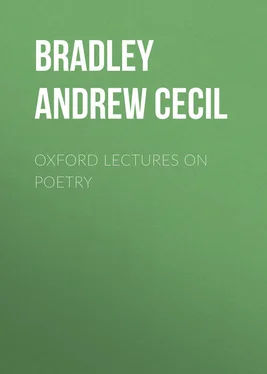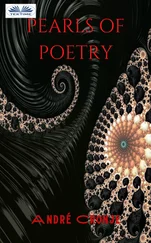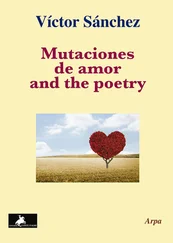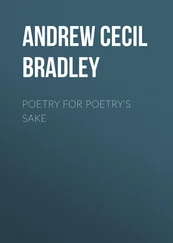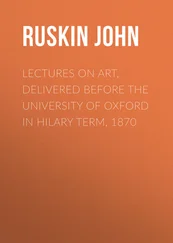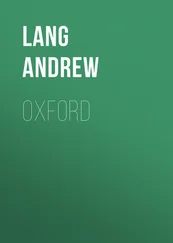Andrew Bradley - Oxford Lectures on Poetry
Здесь есть возможность читать онлайн «Andrew Bradley - Oxford Lectures on Poetry» — ознакомительный отрывок электронной книги совершенно бесплатно, а после прочтения отрывка купить полную версию. В некоторых случаях можно слушать аудио, скачать через торрент в формате fb2 и присутствует краткое содержание. ISBN: , Жанр: foreign_antique, foreign_prose, foreign_poetry, на английском языке. Описание произведения, (предисловие) а так же отзывы посетителей доступны на портале библиотеки ЛибКат.
- Название:Oxford Lectures on Poetry
- Автор:
- Жанр:
- Год:неизвестен
- ISBN:http://www.gutenberg.org/ebooks/36773
- Рейтинг книги:4 / 5. Голосов: 1
-
Избранное:Добавить в избранное
- Отзывы:
-
Ваша оценка:
- 80
- 1
- 2
- 3
- 4
- 5
Oxford Lectures on Poetry: краткое содержание, описание и аннотация
Предлагаем к чтению аннотацию, описание, краткое содержание или предисловие (зависит от того, что написал сам автор книги «Oxford Lectures on Poetry»). Если вы не нашли необходимую информацию о книге — напишите в комментариях, мы постараемся отыскать её.
Oxford Lectures on Poetry — читать онлайн ознакомительный отрывок
Ниже представлен текст книги, разбитый по страницам. Система сохранения места последней прочитанной страницы, позволяет с удобством читать онлайн бесплатно книгу «Oxford Lectures on Poetry», без необходимости каждый раз заново искать на чём Вы остановились. Поставьте закладку, и сможете в любой момент перейти на страницу, на которой закончили чтение.
Интервал:
Закладка:
16
I do not mean to imply that in aesthetic apprehension itself we always, or generally, make conscious use of a standard or, indeed, think of greatness. But here we are reflecting on this apprehension.
17
Thus, it may be noticed, the sparrow’s size, which is the reverse of sublime, is yet indirectly essential to the sublimity of the sparrow.
18
The poet’s language here has done our analysis for us.
19
A word may be added here on a disputed point as to ‘spiritual’ sublimity. It has been held that intellect cannot be sublime; but surely in the teeth of facts. Not to speak of intellect as it appears in the sphere of practice, how can it be denied that the intellect of Aristotle or Shakespeare or Newton may produce the impression of sublimity? All that is true is, first, that the intellect must be apprehended imaginatively and not thought abstractly (otherwise it can produce no aesthetic impression), and, secondly, that it appears sublime in virtue not of its quality alone but of the quantity, or force, of that quality.
20
The same principle applies to other cases. If, for example, the desolation of a landscape is felt to be sublime, it is so not as the mere negation of life, verdure, etc., but as their active negation.
21
The reader will remember that in one sense of the question, Is there no more in the sublime than overwhelming greatness? this question must of course be answered in the affirmative. Sublimity is a mode of beauty: the sublime is not the overwhelmingly great, it is the beautiful which has overwhelming greatness; and it affects us through its whole nature, not by mere greatness.
22
I am warning the reader against a mistake which may arise from the complexity of aesthetic experience. We may make a broad distinction between ‘glad’ and ‘sad’ modes of beauty; but that does not coincide with the distinction of modes with which we are concerned in this lecture. What is lovely or ‘beautiful’ may be glad or sad, and so may what is grand or sublime.
23
In what follows I have spoken as if the two were always successive stages, and as if these always came in the same order. It is easier to make the matter quickly clear by taking this view, which also seemed to answer to my own experience. But I do not wish to commit myself to an opinion on the point, which is of minor importance. What is essential is to recognise the presence of the two ‘aspects’ or ‘stages,’ and to see that both are requisite to sublimity.
24
‘Ich fühlte mich so klein, so gross,’ says Faust, remembering the vision of the Erdgeist, whom he addresses as ‘Erhabener Geist.’ He was at once overwhelmed and uplifted.
25
At least if the ‘Vision’ is sublime its sublimity is not that of the original. We can ‘discern the form thereof’ distinctly enough.
26
To avoid complication I have passed by the case where we compare the sublime thing with another thing and find it much greater without finding it immeasurably great. Here the greatness, it appears to me, is still unmeasured. That is to say, we do not attempt to determine its amount, and if we did we should lose the impression of sublimity. We may say , perhaps, that it is ten, fifty, or a million times, as great; but these words no more represent mathematical calculations than Hamlet’s ‘forty thousand brothers.’
27
I am far from being satisfied with the ideas imperfectly expressed in the first and third of these Notes, but they require more consideration than I can give to them during the printing of the Second Edition. The reader is requested to take them as mere suggestions.
28
Hence a creature much less powerful than ourselves may , I suppose, be sublime, even from the mere point of view of vital energy. But I doubt if this is so in my own case. I have seen ‘magnificent’ or ‘glorious’ cocks and cats, but if I called them ‘sublime’ I should say rather more than I feel. I mention cocks, because Ruskin somewhere mentions a sublime cock; but I cannot find the passage, and this cock may have been sublime (if it really was so to Ruskin) from some other than ‘vital’ greatness.
29
See, primarily, Aesthetik , iii. 479-581, and especially 525-581. There is much in Aesthetik , i. 219-306, and a good deal in ii. 1-243, that bears on the subject. See also the section on Greek religion in Religionsphilosophie , ii. 96-156, especially 131-6, 152-6; and the references to the death of Socrates in Geschichte der Philosophie , ii. 81 ff., especially 102-5. The works so far cited all consist of posthumous redactions of lecture-notes. Among works published by Hegel himself, the early essay on ‘Naturrecht’ ( Werke , i. 386 ff.), and Phaenomenologie d. Geistes , 320-348, 527-542, deal with or bear on Greek tragedy. See also Rechtsphilosophie , 196, note. There is a note on Wallenstein in Werke , xvii. 411-4. These references are to the second edition of the works cited, where there are two editions.
30
His theory of tragedy is connected with his view of the function of negation in the universe. No statement therefore which ignores his metaphysics and his philosophy of religion can be more than a fragmentary account of that theory.
31
I say ‘might,’ because Hegel himself in the Phaenomenologie uses those very terms ‘divine’ and ‘human law’ in reference to the Antigone .
32
See Note at end of lecture.
33
This interpretation of Hegel’s ‘abstract’ is more or less conjectural and doubtful.
34
Hegel’s meaning does not fully appear in the sentences here condensed. The ‘blessedness’ comes from the sense of greatness or beauty in the characters.
35
Hegel himself expressly guards against this misconception.
36
The same point may be put thus, in view of that dangerous word ‘personality.’ Our interest in Macbeth may be called interest in a personality; but it is not an interest in some bare form of self-consciousness, nor yet in a person in the legal sense, but in a personality full of matter. This matter is not an ethical or universal end, but it must in a sense be universal – human nature in a particular form – or it would not excite the horror, sympathy, and admiration it does excite. Nor, again, could it excite these feelings if it were not composed largely of qualities on which we set a high value.
37
In relation to both sides in the conflict (though it may not need to negate life in both). For the ultimate agent in the catastrophe is emphatically not the finite power of one side. It is beyond both, and, at any rate in relation to them, boundless.
38
The following pages reproduce the two concluding lectures of a short course on the Age of Wordsworth, given at Oxford in April, 1903, and intended specially for undergraduates in the School of English Language and Literature. A few passages from the other lectures appear elsewhere in this volume. On the subject of the course may I advise any reader who may need the advice to consult Professor Herford’s The Age of Wordsworth , a little book which is familiar to students of the history of English Literature, and the more admired the more they use it?
Читать дальшеИнтервал:
Закладка:
Похожие книги на «Oxford Lectures on Poetry»
Представляем Вашему вниманию похожие книги на «Oxford Lectures on Poetry» списком для выбора. Мы отобрали схожую по названию и смыслу литературу в надежде предоставить читателям больше вариантов отыскать новые, интересные, ещё непрочитанные произведения.
Обсуждение, отзывы о книге «Oxford Lectures on Poetry» и просто собственные мнения читателей. Оставьте ваши комментарии, напишите, что Вы думаете о произведении, его смысле или главных героях. Укажите что конкретно понравилось, а что нет, и почему Вы так считаете.
